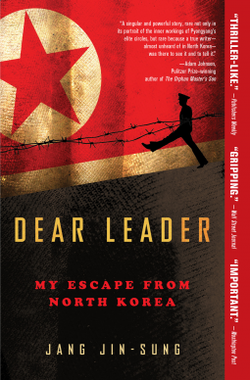
Reviewed for NetGalley
* * * * *
Dear Leader, by Jang Jin-Sung, is a thoroughly enlightening tale. It presents a unique opportunity to “visit” North Korea firsthand.
As a young man, Jin-Sung rose to the level of “poet laureate” to Kim Jong-il. Artists enjoy a privileged position in North Korea, where they are used as tools of the totalitarian state. Indeed, Kim Jong-il stressed that he ruled “through music and literature.” Jin-Sung reports that Jong-il was not “a dictator by means of physical control, but . . . in a more subtle and pervasive sense—through his absolute power over the cultural identity of his people.” This is a sobering idea for citizens of a free society to consider. The principles regarding the importance of free speech, of a media that is responsible to the people and not to the government, and of representatives who are to see first to the interests of their constituents and not to the State, take on new meaning . . .
When Jin-Sung, a favored citizen, is summoned to meet his “Dear Leader” personally, he discovers to his surprise, that Jong-il is—human—just a person like any other—who, shorter than Jin-Sung had imagined, even wears two-inch heels so as to appear taller. Eventually, these facts are added to the knowledge Jin-Sung gained from having read literary works from the free world. He begins to seriously question things. When circumstances occur that leave him in fear for his life, he escapes.
From the opening pages, in which Jin-Sung discusses the procedures used to take him and others to a meeting with Jong-il, Jin-Sung displays the awful truths of North Korean society. It is startling to consider the lengths the regime goes to in order to keep the truth from its people and to protect its “Dear Leader.” Citizens are taught that their loyalty to the leader is the supreme goal, second to nothing—not to themselves and not to their families or children. Jin-Sung expands upon the practicalities of the North Korean system, from the use of food distribution centers to the starving of the masses, to the special treatment the favored receive. Tragically, North Korea’s people live with the everyday truth that their lives are of no value to their nation’s leadership.
Jin-sung tells his story of escape from North Korea, a harrowing experience. He underscores the particular evils that North Korean women face as victims in the world’s sex-slave market. Overall, this was an engaging and enlightening read. It emphasizes the vulnerability of our own free society in the face of any who would argue for the value of the State over that of the individual . . .
* * * * *
Dear Leader, by Jang Jin-Sung, is a thoroughly enlightening tale. It presents a unique opportunity to “visit” North Korea firsthand.
As a young man, Jin-Sung rose to the level of “poet laureate” to Kim Jong-il. Artists enjoy a privileged position in North Korea, where they are used as tools of the totalitarian state. Indeed, Kim Jong-il stressed that he ruled “through music and literature.” Jin-Sung reports that Jong-il was not “a dictator by means of physical control, but . . . in a more subtle and pervasive sense—through his absolute power over the cultural identity of his people.” This is a sobering idea for citizens of a free society to consider. The principles regarding the importance of free speech, of a media that is responsible to the people and not to the government, and of representatives who are to see first to the interests of their constituents and not to the State, take on new meaning . . .
When Jin-Sung, a favored citizen, is summoned to meet his “Dear Leader” personally, he discovers to his surprise, that Jong-il is—human—just a person like any other—who, shorter than Jin-Sung had imagined, even wears two-inch heels so as to appear taller. Eventually, these facts are added to the knowledge Jin-Sung gained from having read literary works from the free world. He begins to seriously question things. When circumstances occur that leave him in fear for his life, he escapes.
From the opening pages, in which Jin-Sung discusses the procedures used to take him and others to a meeting with Jong-il, Jin-Sung displays the awful truths of North Korean society. It is startling to consider the lengths the regime goes to in order to keep the truth from its people and to protect its “Dear Leader.” Citizens are taught that their loyalty to the leader is the supreme goal, second to nothing—not to themselves and not to their families or children. Jin-Sung expands upon the practicalities of the North Korean system, from the use of food distribution centers to the starving of the masses, to the special treatment the favored receive. Tragically, North Korea’s people live with the everyday truth that their lives are of no value to their nation’s leadership.
Jin-sung tells his story of escape from North Korea, a harrowing experience. He underscores the particular evils that North Korean women face as victims in the world’s sex-slave market. Overall, this was an engaging and enlightening read. It emphasizes the vulnerability of our own free society in the face of any who would argue for the value of the State over that of the individual . . .


